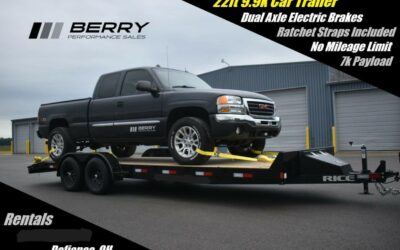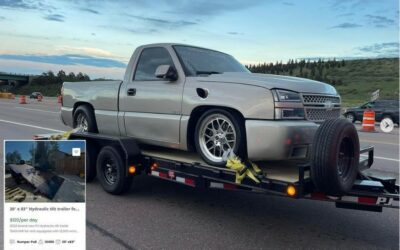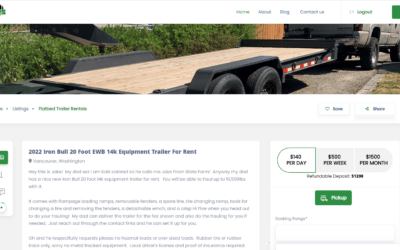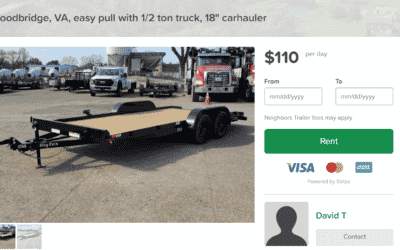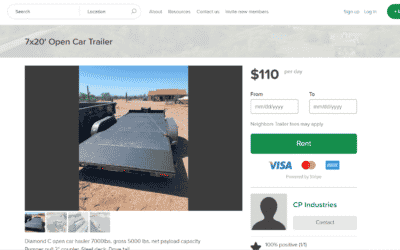Written by Neighbors Trailer
Are you planning on getting a rental trailer for your next adventure? Perhaps you need a trailer to haul heavy loads to and from your job site.
Regardless of the reasons you need to get one, trailer safety should always be a top priority. A lot goes into ensuring your trailer is ready for you to tow on the next trip.
Whether you are hauling trash and debris when cleaning up after finishing a job or hauling mulch off your yard to the landfill, the key to trailer safety is knowing the best way to load your trailer.
Learning how to safely load the trailer requires understanding a few common terms. Knowing these terms can help you determine how much weight you can load on the trailer.
Gross Vehicle Weight Rating
Your trailer’s GVWR is the maximum weight allowed for both the cargo and the trailer itself. The GVWR is typically available on the trailer’s VIN label. You can find the VIN label on the tongue.
Gross Axle Weight Rating
The GAWR is the maximum distributed weight a vehicle’s axles can handle. It usually includes indicators for the front and rear axles. GAWR with FR is for the front axles and GAWR with RR is for the rear axles. The GAWR is also available on the trailer’s VIN label.
Tongue Weight
Tongue weight is the static force a trailer tongue exerts on the hitch ball. It is easier to understand this with an explanation. You need to have the right amount of weight on the trailer tongue. Too little tongue weight might make the trailer sway from side to side. Too much, and you could end up overloading the rear tires on the truck towing the trailer.
You can take your trailer to a place with a certified scale, typically available at truck stops. Park your tow vehicle on the scale and measure its weight. It should be lower than the GVWR of the tow vehicle. After that, attach the trailer to the tow vehicle and pull it onto the scale.
Uncouple the trailer from the vehicle and measure the total trailer weight. Couple the trailer and tow vehicle again and move the tow truck’s wheels off the scale while ensuring the trailer’s axles are on the scale to get the axle weight.
Minus the axle weight from the total weight you measured earlier to get the tongue weight. Ideally, no more than 25% of the trailer and cargo’s weight should be on the tongue to ensure safe handling.
7 Trailer Safety Tips – The Safest Way to Load Your Trailer
Now that you have an idea of how much weight your trailer can tow safely behind your vehicle, it is time to learn the safest way to load the trailer.
1. Park the Trailer on an Even Surface
First things first, you need to park your trailer on a level surface. Parking it on an uneven surface increases the risk of it tilting or completely tipping when you start loading it. You also need to ensure there is enough room for you to back up the truck when it is time to couple the hitch.
2. Take out Your Wheel Chocks
You need to make sure your trailer is not going anywhere when you begin loading. Parking it on an even surface is not enough. We advise using wheel chocks to hold it in place. This will prevent any shifting once you start loading.
If you do not have wheel chocks, you can simply hitch the trailer to your truck and engage the emergency brake.
3. Understand the Ideal Weight Distribution
Before you start loading anything onto the trailer, you should quickly check the cargo you plan on hauling. Proper weight distribution is the key to trailer safety, and you should roughly plan where you will place the cargo in the trailer.
Ideally, 60% of the weight of the cargo should be closer to the front of the trailer and 40% to the back. Following this rule ensures proper tongue weight and prevents the trailer from swaying side to side. The weight distribution should be completely even from side to side.
4. Start With the Heavy Cargo
Now that you have an idea of what should go where, it is time to start loading. The ideal way to load the trailer is to begin with the heaviest items. Take the heaviest cargo and bring it closer to the front of the trailer, ensuring it is in the center from the sides. Having space on the sides can help you load lighter cargo around it for even weight distribution.
5. Bring out the Straps
Once you have loaded the trailer with the bulkiest items, you should use straps to tie down the cargo to your trailer. The trailer should have tie-down anchors. You do not need to get specialized straps for the cargo. Good rope, ratchet straps, or chains can do the trick.
Properly securing the heavy cargo is critical to ensure trailer safety. You do not want it to come loose on a rough patch during the trip while towing. Once you secure the ropes or ratchet straps, make sure you tie off the extra rope. Otherwise, you could risk getting the rope caught in the wheels when towing the trailer.
6. Place the Lightweight Cargo on top
Now that you have the heaviest items strapped and secure, you can get to the lighter cargo. Evenly distribute any light cargo around or on top of the heavy cargo, provided it is safe. If you have plenty of smaller items, it would be a good idea to use a tarp to cover the trailer once you finish loading.
7. Hitch it up and Test the Lights
Hitch the trailer onto the truck, properly couple the hitch, and test the signal lights on the trailer. You should also check the tongue weight at this point to check if you need to make any adjustments before you hit the open road.
Are You Looking for a Rental Trailer to Haul Your Cargo?
You now know how to safely load the cargo on your trailer. Assuming that you have already arranged a rental trailer, you should be good to go. If you are still shopping for rental trailers, we can help.
Choosing a trailer with a GVWR and GAWR matching your towing vehicle’s requirements is necessary to ensure trailer safety. The trailer itself needs to be in excellent condition to help you get the best out of it.
The Neighbors Trailer’s P2P marketplace boasts an extensive collection of rental listings available for you to choose from. We are confident you can find the perfect fit on our platform.
Did You Know We Get Over 1100 Trailer Rental Leads Per Day?
We want to send business your way!
Related Articles
Fully-Loaded Mobile Car Wash and Detail Trailers for Rent in Atlanta, GA
Setting up a car wash and detailing business typically requires a massive investment, but if you are based in Atlanta, GA, and willing to think outside the box, there’s a great opportunity for you.
Car Hauler Trailer for Rent in Defiance, OH
Are you traveling from one place to another and have two vehicles to take with you without a driver for the second car? You can always hire a professional transportation company. Of course, you must understand that it will be expensive. Since you’re already driving...
Hydraulic Tilt Flatbed Trailer for Rent in Denver CO
Do you need to haul a car, equipment, or various other types of cargo from time to time? Renting might be the best way to go. Buying a high-quality trailer fit for various applications is expensive. Finding a place to park it and paying for its maintenance, especially...
Equipment Trailer Rental Vancouver, WA
Rent this trailer from a dog named Jake in Vancouver, WA.
Car Trailer Rental in Woodbridge VA
If you find the need for the occasional use of a car trailer, renting may be your best option. The cost of purchasing a trailer, finding a place to park it, and the maintenance to be performed, are all issues the new trailer owners must consider. At Neighbors...
Car Trailer Rental in Queen Creek AZ
A car trailer can be hard to find and expensive to buy. At Neighbors Trailer we have fixed that problem and made trailers easy to find and rent nationwide and cut out the cost of a purchase.
Stay Up to Date With The Latest News & Updates
Join For Free
Search for rentals or list your own trailer rental.
Join Our Newsletter



